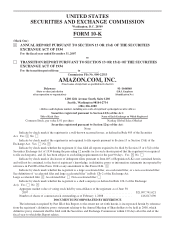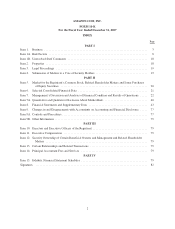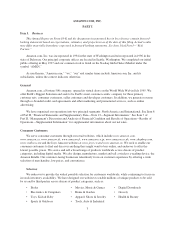Amazon.com 2007 Annual Report Download - page 19
Download and view the complete annual report
Please find page 19 of the 2007 Amazon.com annual report below. You can navigate through the pages in the report by either clicking on the pages listed below, or by using the keyword search tool below to find specific information within the annual report.• difficulty in staffing, developing and managing foreign operations as a result of distance, language and
cultural differences;
• different employee/employer relationships and the existence of workers’ councils and labor unions;
• laws and policies of the U.S. and other jurisdictions affecting trade, foreign investment, loans and taxes;
and
• geopolitical events, including war and terrorism.
As the international e-commerce channel grows, competition will intensify. Local companies may have a
substantial competitive advantage because of their greater understanding of, and focus on, the local customer, as
well as their more established local brand names. We may not be able to hire, train, retain, and manage required
personnel, which may limit our international growth.
In 2004, we acquired Joyo.com Limited, which is organized under the laws of the British Virgin Islands and
through a People’s Republic of China (“PRC”) entity, provides technology and services for the Joyo Amazon
websites at www.joyo.cn and www.amazon.cn. The PRC regulates Joyo Amazon’s business through regulations
and license requirements restricting (i) foreign investment in the Internet, retail and delivery sectors, (ii) Internet
content and (iii) the sale of media products. In order to meet local ownership and regulatory licensing
requirements, Joyo Amazon’s business is operated by PRC companies owned by nominee shareholders who are
PRC nationals. Although we believe Joyo Amazon’s structure complies with existing PRC laws, it involves
unique risks. There are substantial uncertainties regarding the interpretation of PRC laws and regulations, and it
is possible that the PRC government will ultimately take a view contrary to ours. If Joyo Amazon (including its
subsidiary and affiliates) were found to be in violation of any existing or future PRC laws or regulations or if
interpretations of those laws and regulations were to change, the business could be subject to fines and other
financial penalties, have its licenses revoked or be forced to shut down entirely. In addition, if Joyo Amazon were
unable to enforce its contractual relationships with respect to management and control of its business, it might be
unable to continue to operate the business.
If We Do Not Successfully Optimize and Operate Our Fulfillment Centers, Our Business Could Be Harmed
If we do not successfully operate our fulfillment centers, it could significantly limit our ability to meet
customer demand. Because it is difficult to predict demand, we may not manage our facilities in an optimal way,
which may result in excess or insufficient inventory or warehousing, fulfillment, and distribution capacity. A
failure to optimize inventory will increase our net shipping cost by requiring long-zone or partial shipments.
Orders from several of our websites are fulfilled primarily from a single location, and we have only a limited
ability to reroute orders to third parties for drop-shipping. We and our co-sourcers may be unable to adequately
staff our fulfillment and customer service centers. As we continue to add fulfillment and warehouse capability or
add new businesses with different fulfillment requirements, our fulfillment network becomes increasingly
complex and operating it becomes more challenging. If the other businesses on whose behalf we perform
inventory fulfillment services deliver product to our fulfillment centers in excess of forecasts, we may be unable
to secure sufficient storage space and may be unable to optimize our fulfillment centers. There can be no
assurance that we will be able to operate our network effectively.
We rely on a limited number of shipping companies to deliver inventory to us and completed orders to our
customers. If we are not able to negotiate acceptable terms with these companies or they experience performance
problems or other difficulties, it could negatively impact our operating results and customer experience. In
addition, our ability to receive inbound inventory efficiently and ship completed orders to customers also may be
negatively affected by inclement weather, fire, flood, power loss, earthquakes, labor disputes, acts of war or
terrorism, acts of God and similar factors.
Third parties either drop-ship or otherwise fulfill an increasing portion of our customers’ orders, and we are
increasingly reliant on the reliability, quality and future procurement of their services. Under some of our
11
























